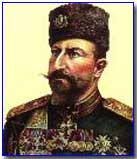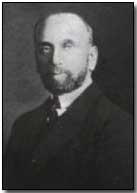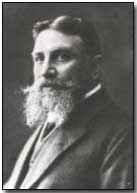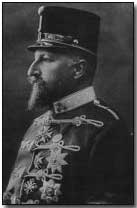Memoirs & Diaries - Bulgaria's Treachery Against Russia
 The fact that Bulgaria
threw in her lot at last with Germany was not viewed in Russia with great
surprise.
The fact that Bulgaria
threw in her lot at last with Germany was not viewed in Russia with great
surprise.
Public opinion had expected that something of the kind would happen ever since King Ferdinand had begun to exhibit his German sympathies and to turn a deaf ear to the advice which the Allies had tried to give him.
Relations between the cabinets of Petrograd and of Sofia had been strained by the Balkan wars, when Serbia had won in Russia the sympathies which, by her conduct, Bulgaria had lost.
M. Sazonov hoped against hope that wisdom would prevail among the Bulgarian politicians, and that even if the King were determined to throw in his lot with that of the German States and with Austria-Hungary, the secular enemy of the Slav cause, his advisers and ministers would not allow him to embark on such a suicidal policy.
Unfortunately these hopes proved entirely false, partly on account of the weak diplomacy of the Russian representative at the court of Sofia, M. Savinsky, who was anything but a statesman, and who instead of giving his whole attention to the difficult political situation of Bulgaria preferred spending his time playing tennis and flirting with fair ladies.
He had been a great favourite in his circle at Petrograd, where he had taken himself much too seriously, and at Stockholm, previous to his appointment in Sofia, he had been greatly petted by society.
He was absolutely no match for King Ferdinand, who did not even consider it a triumph to hoodwink him. By the disquieting reports which M. Savinsky sent to his immediate chiefs, he lured them on to a false security that allowed the crafty Coburger to commit treason the moment he thought he could do so without risk.
 It
would be difficult to find a more mismanaged affair than the Balkan crisis.
Bulgaria ought to have been persuaded into accepting the conditions offered
to her, instead of being merely irritated. Action should have been
taken instead of letting things drift until it became impossible to improve
them, or to remedy the decisions taken by the unscrupulous ruler of an
unscrupulous people.
It
would be difficult to find a more mismanaged affair than the Balkan crisis.
Bulgaria ought to have been persuaded into accepting the conditions offered
to her, instead of being merely irritated. Action should have been
taken instead of letting things drift until it became impossible to improve
them, or to remedy the decisions taken by the unscrupulous ruler of an
unscrupulous people.
But the Russian Foreign Office always kept a latent feeling of kindness for Bulgaria, and never quite realized that all its efforts to win her as an ally had not only failed, but had had the opposite influence. cBulgaria did not care any longer for Russia; it is to be doubted whether she had ever cared for her at all.
Bulgaria was ambitious; Bulgaria had dreams about Constantinople, which she considered as her future possession, and knowing that Russia would prove a serious rival for her in that direction, she aspired to liberate herself from any obligations in regard to her old patron, whom she began to hate as events unfolded themselves in the Near East, with a hatred the more ferocious that it was absolutely unjustified.
Russian influence, which in spite of official opinion in Petrograd, had never been firmly established in Bulgaria, and which, in his brief day of power, Prince Alexander of Battenberg had attempted to shake off, was quite dead when the Great War began; the Turk had far more chance to be listened to at Sofia than M. Sazonov.
Nevertheless, there existed still in Petrograd enthusiastic though weak-minded people who could not reconcile themselves to the accomplished facts of Bulgaria's misdeeds. It was partly due to this foolish faction that a considerable portion of Russian society felt that we ought not to draw the sword against those Slav brethren, or bratouschki, whom, earlier, we had delivered from the Turkish yoke.
To many, therefore, the treason of Bulgaria, bound as she ought to have been by the closest ties of gratitude, came as a shock; but the majority, who had seen it coming, declared that, after all, it was a thousand times preferable to have an avowed foe than to run the risk of being betrayed by a false friend.
 This,
however, was poor consolation in the face of the fact that the alliance of
Bulgaria with Germany and with Turkey would assure the direct communication
of these two powers with each other, and thus add considerably to the
already numerous difficulties with which the Allies were finding themselves
confronted in the Balkans.
This,
however, was poor consolation in the face of the fact that the alliance of
Bulgaria with Germany and with Turkey would assure the direct communication
of these two powers with each other, and thus add considerably to the
already numerous difficulties with which the Allies were finding themselves
confronted in the Balkans.
Some people said that it would perhaps have been more judicious on the part of Russia not to have issued its ultimatum to King Ferdinand until he had thrown off his mask and spontaneously announced his intentions of becoming untrue to all the promises which he had made.
All the same, considering the dignity of a great country like Russia, it could hardly have been expected that she would remain quiet under provocations which were as insolent as they were disgraceful.
King Ferdinand acted throughout with that hypocrisy in which he had always shown himself a master. He began by saying that he had done all that lay within his power to remain upon good terms with the Russian Government, but that the bulk of the Bulgarian nation, being opposed to Russia, were not going to continue to be bullied by the latter country, as had been the case lately.
He therefore found himself compelled to submit to the wishes of his people. He also considerately added that he was convinced the Central Powers would be victorious, and so he could not pursue any other policy, an avowal which had at least the merit of being perfectly frank, a thing that must have astonished Ferdinand himself, so little used was he to tell the truth.
The Greek question also was causing trouble and anxiety, and altogether the position in the Balkans seemed to have assumed a most grave character, one of the worst features being the possibilities of new surprises every day coming from the most unexpected quarters. With a man like King Ferdinand treason was a matter of indifference, and he could with perfect equanimity try to win the friendship of those whom he had reviled a few days before.
A man who knew him well, and who happened to have been at Sofia while negotiations were still going on between the Bulgarian Government and Serbia, wrote to me as follows on his return:
My journey has been a most interesting one, but I am not at all sorry it has come to an end.
Bulgaria is not a nice country to live in at the present moment. One has all the time the feeling that one is allowed to exist on sufferance, and that the inhabitants of this land look upon one with the eyes of a crocodile about to swallow the victim he has been watching for a long time.
King Ferdinand is surely meditating some big coup from which he probably hopes to obtain at last supremacy over the whole of the Balkan Peninsula, an ambition he has had ever since his acceptance of the Bulgarian throne.
It was a tremendous mistake not to oblige Serbia to concede everything her neighbour asked from her, rather than furnish Bulgaria with a pretext for joining the ranks of her enemies. The idea that it would have been useless because Ferdinand would always have remained the tool of Austria was a perfectly foolish one.
First of all, Ferdinand has never been the tool of anybody, or of anything, save perhaps of his own ambition. He has absolutely no sympathies for Austria, or for Francis Joseph, who more than once has humiliated him, and made him feel that they had nothing in common.
He hates Russia just as much, and tolerates Germany and its Kaiser simply because it seems to him that from that quarter he may expect the most.
The great strength of the man consists in his knowledge of his own importance at this moment of crisis, when his going over to one side or to the other means so much to those with whom he chooses to throw in his lot.
His uncommon cuteness makes him realize that where two quarrel then is the opportunity for a third party to take what he considers his own, and to get what he wants: Ferdinand certainly does not belong to the people who miss their opportunities.
He has been preparing himself all along for the part he means to play now, and he has contrived to assure himself of the cooperation of many influential persons in Bulgaria, who from quite different motives from his own would like to get rid of Russian influence and Russia's constant interference in the affairs of their country and of the Balkan Peninsula.
Being perfectly aware that it is highly improbable that Russia will be allowed to take Constantinople, he would like to be the one personage indicated to supplant the Sultan on that throne of ancient Byzantium which he has coveted ever since he set foot on Bulgarian soil.
With quite an artistic touch King Ferdinand has slowly fomented an intense distrust against Russia amongst his subjects, and persuaded them that Russia, instead of having their interests at heart, is aspiring to put one of her Grand Dukes in the Palace of Sofia, and to make Bulgaria a Russian province.
The idea, of course, is a most distasteful one, and Ferdinand has found in it one of his best pretexts for persuading his ignorant and unsuspicious people that it would be to their advantage to join the Central Powers in their struggle against the Allies.
His excellent argument for enforcing his opinions has been to put into prison all those who ventured to question them or to challenge their sincerity. Sofia swarms with spies, who keep the Government informed of all the persons whose influence might be exercised against the King and his schemes.
I can assure you that though King Ferdinand received me, and asked me to dinner, and showed himself most gracious toward me - in memory of the past, I suppose - yet I was not at all sure when I went to bed that I might not be wakened during the night by gendarmes come to arrest me, and I heaved a deep sigh of relief when I had crossed the Bulgarian frontier.
Nothing that can happen in that land of surprises will astonish me, and even if Ferdinand decided to pass over to the enemy, and to put his army at the disposal of Germany, this would not mean at all that he could not change his mind at the eleventh hour, because after he had started on the war path he might, if the allurement proved sufficiently strong to tempt him, invoke that conscience of which he has made such profitable use, and explain to his subjects that he had convinced himself the Allies were in the right.
No man alive has ever practiced better than he has done the art of forgetting his resolutions of the day before in favour of his sympathies of the next.
 There
was certainly a good deal in what my correspondent wrote, and it is most
likely that if the Russian Foreign Office had been a little more tactful,
Bulgaria's neutrality might have been secured.
There
was certainly a good deal in what my correspondent wrote, and it is most
likely that if the Russian Foreign Office had been a little more tactful,
Bulgaria's neutrality might have been secured.
M. Sazonov, however, was far too honest to promise what he did not intend or mean to grant. Rather than compromise himself by negotiations which might have been interpreted in a false light, he preferred to send the ultimatum to the Bulgarian Government, which resulted in the rupture of diplomatic relations between Petrograd and Sofia.
Very soon afterwards the Czar announced to his faithful subjects that the Bulgaria which we had created and delivered from the Turkish yoke had turned traitor to us, and joined the ranks of our enemies.
The great question which followed upon this announcement was how to get to the help of Serbia before the latter country had been entirely annihilated by the combined Austrian and German armies.
Whilst these events were taking place, the Allies were landing as many men as they could at Salonika, but were confronted by new difficulties coming from Greece. The war was beginning once more to assume a character more favourable to our enemies than it had done for the last three months, and it was also getting more and more agonizing, owing to the suspense which it entailed on all those who were immediately concerned.
For Russians the fact of having to fight against Slav brethren was inexpressibly bitter and painful. It added a new horror to all those already experienced; but hard as it was to draw the sword to punish people with whom one had believed most sincerely that one would always remain on brotherly and affectionate terms, awful as it seemed to find that one's own familiar friend had turned false, the moral disaster did not destroy the confidence which Russia felt as to the ultimate issue of the war.
That war had to be won, even if the struggle lasted ten years, even if it extended to a whole century. The German tyrant had to be crushed, German arrogance had to be destroyed.
Source: Source Records of the Great War, Vol. III, ed. Charles F. Horne, National Alumni 1923
Photographs courtesy of Photos of the Great War website.
A "dogfight" signified air combat at close quarters.
- Did you know?
